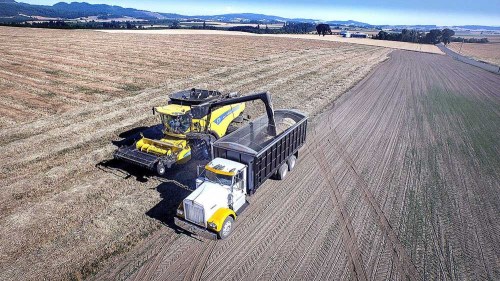Survey gauges Oregon attitudes about agriculture
Published 7:30 am Thursday, July 13, 2023

- A combine empties orchard grass seed into a truck during a harvest in Polk County. A recent survey gauged Oregonian attitudes about farming to help inform policy decisions.
PORTLAND — Though they have more affection for small farmers, most Oregonians recognize large agricultural operations are needed to produce adequate food supplies, a recent survey found.
Attitudes about farming among Oregonians were recently gauged by the Oregon Values and Beliefs Center, a nonpartisan nonprofit that researches public opinion to inform the policy positions of lawmakers, advocates and others.
Trending
“They don’t have good information about how people feel about farming. We want them to have good information to help Oregonians,” said Amaury Vogel, the center’s associate executive director.
The survey is the organization’s first to measure statewide beliefs about agriculture, a subject on which data is limited even at the national level, Vogel said.
Oregonians support small farms
Perhaps unsurprisingly, Oregon residents expressed support for small-scale farmers across demographic groups, she said. About 83% of respondents had positive views of small farms, while only 16% were ambivalent and 1% had negative associations.
Opinions among survey participates were divided about large-scale farms: 25% viewed them positively, 29% viewed them negatively and a 46% plurality saw them neither negatively or positively.
Large farms necessary
Trending
However, 63% of survey respondents agreed large-scale farms are necessary to ensure sufficient food for the population, while only 19% disagreed with that statement. The remainder said they didn’t know or that it depended on crop type.
“People acknowledged they were important to keeping food prices manageable,” Vogel said.
Most survey participants encountered agriculture as consumers, with a 54% majority reporting they’ve purchased fruits or vegetables at a farm in the past year. U-pick operations, pumpkin patches, special events and Christmas tree purchases were among the other top reasons they visited farms.
Some had more personal connections to the industry, however: 29% said a close friend or relative was involved in farming, 19% have lived on farms, 13% have worked on farms, and 6% have owned farms.
On average, survey participants thought 38% of the food supply was produced by small farms and 62% by large-scale farms. Having inexpensive food was considered more important than farm size by 39% of respondents, while 36% disagreed with this sentiment.
The survey described small-scale farms as those earning less than $350,000 in yearly revenues that are commonly operated by families, require hands-on work and grow more diverse crops for local and regional markets.
Large-scale farms were described as those commonly earning millions of dollars in annual revenues that are owned by corporate shareholders, grow less diversified crops with heavy machinery and rely more on wholesale markets.
Vogel said the definitions were based on economic classifications from the U.S. Department of Agriculture.
According to the agency, nearly 90% of farms are considered small but represent about 20% of the nation’s farm production by value. Large farms make up less than 3% of operations but generate 46% of farm production by value.
However, families run 98% of all farms, regardless of size, and generate 87% of the country’s farm production, according to USDA.
The Oregon Values and Beliefs Center doesn’t advocate for any particular position in controversies involving agriculture or other subject it studies, Vogel said.
“The research is available to both sides of the argument and they can plead their case to the public however they’d like,” she said.









